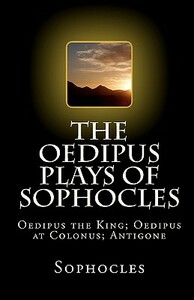Take a photo of a barcode or cover
550 reviews for:
The Oedipus Plays of Sophocles: Oedipus the King; Oedipus at Colonus; Antigone
Sophocles
550 reviews for:
The Oedipus Plays of Sophocles: Oedipus the King; Oedipus at Colonus; Antigone
Sophocles
adventurous
challenging
dark
emotional
sad
slow-paced
Plot or Character Driven:
A mix
Strong character development:
Yes
Loveable characters:
Complicated
Diverse cast of characters:
No
I really loved Antigone but the other two (Oedipus the King and oedipus at Colonus) less so. To be honest, Sophocles seems to be all about melodrama; these read like soap operas for a general audience. He uses tons of idioms. I wonder if he was coining these idioms for the first time, like Shakespearre, or if he was just using tons of tropes and was an unoriginal bore. There are a few beautiful passages and thoughts in the first two.
I thought that Antigone was particularly well-written--beautiful, and full of meaning about what is truly moral when one's own morals are opposed by the dictates of the state.
Themes:
- the ethics of the individual vs the state (Antigone vs Creon)
- the ethics of the dictator vs his people (Creon vs everyone else)
- honoring one's family vs the state
Also this translation seems to be stellar (although I'm not an expert on the original Greek or anything so not fully qualified here, but to my layman's eyes, these feel like really good translations).
I thought that Antigone was particularly well-written--beautiful, and full of meaning about what is truly moral when one's own morals are opposed by the dictates of the state.
Themes:
- the ethics of the individual vs the state (Antigone vs Creon)
- the ethics of the dictator vs his people (Creon vs everyone else)
- honoring one's family vs the state
Also this translation seems to be stellar (although I'm not an expert on the original Greek or anything so not fully qualified here, but to my layman's eyes, these feel like really good translations).
challenging
dark
tense
medium-paced
Plot or Character Driven:
Plot
Strong character development:
Complicated
Loveable characters:
No
Flaws of characters a main focus:
Yes
I only had to read Oedipus The King for school, but I decided to read all three Theban plays while I was at it.
Oedipus The King was the best by far. It just has the most happen in it I suppose. I wasn't too crazy about the writing style, but I've never enjoyed reading plays.
The Greek Mythology part of this made me happy though and I loved applying prior knowledge to places, people, and concepts.
Oedipus The King was the best by far. It just has the most happen in it I suppose. I wasn't too crazy about the writing style, but I've never enjoyed reading plays.
The Greek Mythology part of this made me happy though and I loved applying prior knowledge to places, people, and concepts.
challenging
dark
emotional
fast-paced
Plot or Character Driven:
Character
Strong character development:
Yes
Loveable characters:
Complicated
Diverse cast of characters:
N/A
Flaws of characters a main focus:
Yes
adventurous
tense
slow-paced
Plot or Character Driven:
A mix
Strong character development:
No
Loveable characters:
No
Diverse cast of characters:
No
Flaws of characters a main focus:
Yes
(I read these three plays in the collection [b:The Greek Plays: Sixteen Plays by Aeschylus, Sophocles, and Euripides|25893680|The Greek Plays Sixteen Plays by Aeschylus, Sophocles, and Euripides|Mary Lefkowitz|https://i.gr-assets.com/images/S/compressed.photo.goodreads.com/books/1469408925l/25893680._SY75_.jpg|45775582], a new translation by a group of translators.)
I read these three plays in the order they take place in: Oedipus the King (about Oedipus learning that in trying to avoid the prophecy that he will murder his father and marry his mother ended up unwittingly fulfilling it), Oedipus at Colonus (about Oedipus in self-exile with his daughters seeking the protection of Athens in the last days of his old age and reflecting back on the events of Oedipus the King), and Antigone (about the conflict between Oedipus' daughter and his uncle/current ruler of Thebes over burying the body of Oedipus' son killed in battle for the city). I had previously read and seen Antigone and it has always haunted me (and would note [b:Home Fire|33621427|Home Fire|Kamila Shamsie|https://i.gr-assets.com/images/S/compressed.photo.goodreads.com/books/1587378360l/33621427._SY75_.jpg|54453872], a modern-day retelling of it in the context of global terrorism, is outstanding) but had not read the other two.
I was glad to read Oedipus the King because the story is so classic. But it also felt psychologically remote (Freud's views notwithstanding). It wasn't really Oedipus' fault in any way given that he had no reason to understand who his actual parents were. He wasn't really being "punished" for a character flaw or a bad decision. Instead, it feels more like an exercise in telling a clever story, revealing it piece by piece.
In contrast, Oedipus at Colonus was less thrilling and memorable minute by minute but felt more psychologically modern. Oedipus makes all of the arguments about how it was not his fault, he has a tender relationship to his children, and you witness the authorities of Athens making a choice between their values and realpolitik that has a striking modern resonance.
Finally, returning to Antigone after about thirty years it had lost none of its power. Although it is hard to completely relate to the degree to which honor and the treatment of dead bodies loomed so large for the Greeks, it is understandable. And the poignancy of sacrifice for a cause, the stubbornness of Creon, the way it results in his turning his own son against him, all of this is emotionally powerful and does have the hallmarks of tragedy where one lives with the inevitable consequences of the decision that one makes.
I read these three plays in the order they take place in: Oedipus the King (about Oedipus learning that in trying to avoid the prophecy that he will murder his father and marry his mother ended up unwittingly fulfilling it), Oedipus at Colonus (about Oedipus in self-exile with his daughters seeking the protection of Athens in the last days of his old age and reflecting back on the events of Oedipus the King), and Antigone (about the conflict between Oedipus' daughter and his uncle/current ruler of Thebes over burying the body of Oedipus' son killed in battle for the city). I had previously read and seen Antigone and it has always haunted me (and would note [b:Home Fire|33621427|Home Fire|Kamila Shamsie|https://i.gr-assets.com/images/S/compressed.photo.goodreads.com/books/1587378360l/33621427._SY75_.jpg|54453872], a modern-day retelling of it in the context of global terrorism, is outstanding) but had not read the other two.
I was glad to read Oedipus the King because the story is so classic. But it also felt psychologically remote (Freud's views notwithstanding). It wasn't really Oedipus' fault in any way given that he had no reason to understand who his actual parents were. He wasn't really being "punished" for a character flaw or a bad decision. Instead, it feels more like an exercise in telling a clever story, revealing it piece by piece.
In contrast, Oedipus at Colonus was less thrilling and memorable minute by minute but felt more psychologically modern. Oedipus makes all of the arguments about how it was not his fault, he has a tender relationship to his children, and you witness the authorities of Athens making a choice between their values and realpolitik that has a striking modern resonance.
Finally, returning to Antigone after about thirty years it had lost none of its power. Although it is hard to completely relate to the degree to which honor and the treatment of dead bodies loomed so large for the Greeks, it is understandable. And the poignancy of sacrifice for a cause, the stubbornness of Creon, the way it results in his turning his own son against him, all of this is emotionally powerful and does have the hallmarks of tragedy where one lives with the inevitable consequences of the decision that one makes.





